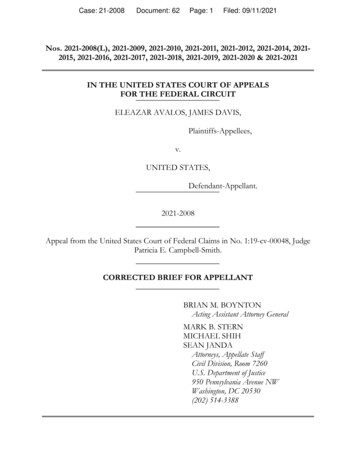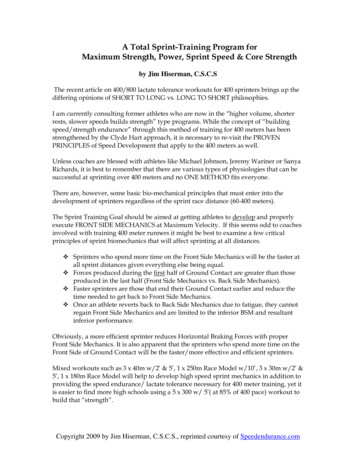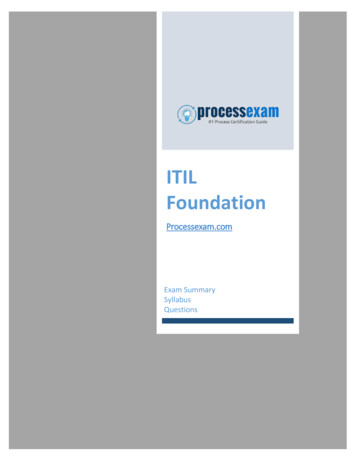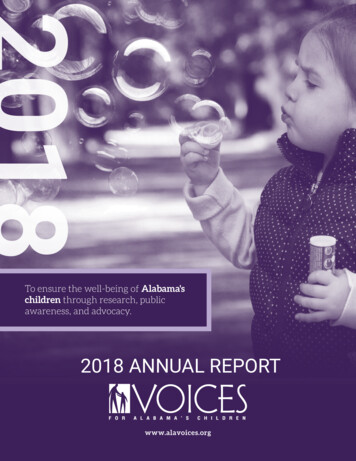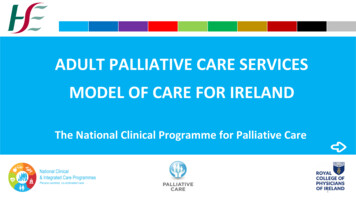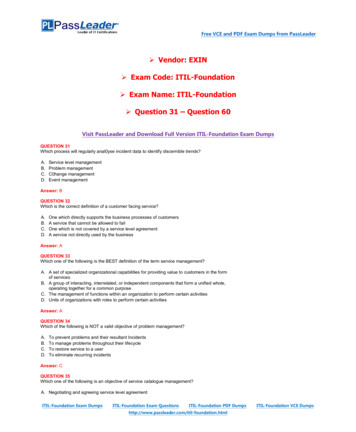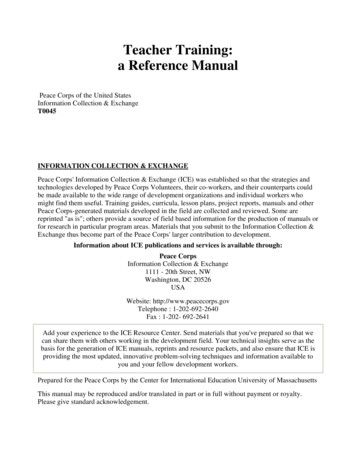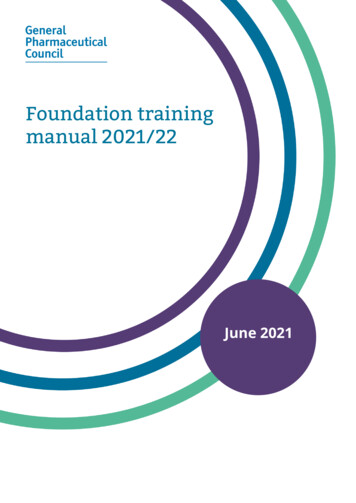
Transcription
Foundation trainingmanual 2021/22June 2021
The text of this document (but not the logo and branding) may be reproduced free of charge in anyformat or medium, as long as it is reproduced accurately and not in a misleading context. Thismaterial must be acknowledged as General Pharmaceutical Council copyright and the documenttitle specified. If we have quoted third party material, you must get permission from the copyrightholder.Contact us at communications@pharmacyregulation.org if you would like a copy of thedocument in another format (for example, in larger type or in a different language). General Pharmaceutical Council 2021
ContentsWelcome from the registrar. 41. The foundation training year . 52. Making the most of your foundation training year . 63. Starting your training . 194. Developing and demonstrating your knowledge and competence . 225. The registration assessment . 316. After the registration assessment . 357. Interim learning outcomes . 378. Useful sources of help and information . 44
June 2021Welcome from the registrarOn behalf of the General PharmaceuticalCouncil (GPhC), let me welcome you to yourfoundation training year.The GPhC is the independent pharmacyregulator in Great Britain. Our role is to protectthe public and give them assurance that theywill receive safe and effective care when usingpharmacy services. We set standards forpharmacy professionals and pharmacies toenter and remain on our register, and we seekassurance that pharmacy professionals andpharmacies continue to meet our standards,including by inspecting pharmacies.We act to protect the public and to upholdpublic confidence in pharmacy if there areconcerns about a pharmacy professional orpharmacy on our register. Through our work wehelp to promote professionalism, supportcontinuous improvement and assure the qualityand safety of pharmacy.We are involved in the lives of pharmacists fromthe day they start their education and training.We set the standards for the initial educationand training of pharmacists (January 2021)and we accredit MPharm and OSPAPprogrammes. We also approve trainingarrangements for the foundation training year(which replaces the pre-registration year fromJuly 2021), and set and run the final assessmentthat you will have to pass before you can applyto be registered as a pharmacist.The foundation training year gives you theopportunity to develop and demonstrate thatyou have the skills, knowledge, understandingand professional behaviours to practise to the4standards expected of a pharmacist. During the52 weeks of the foundation training year youwill be able to apply your academic knowledgein real-life situations and you should take everyopportunity to learn and gain experiencethroughout the year.Your foundation training year is not just aboutassessments, but about learning how to practisein a way that delivers the best outcomes forpatients and members of the public. Yourdesignated supervisor(s) for the foundationtraining year can help to guide you in theseareas.During the foundation training year, we willcommunicate with you through myGPhC andper email.We encourage you to familiarise yourself withthe resources on our website. You can alsoconsult our bi-monthly e-newsletter Regulate.I hope that you enjoy your foundation trainingyear. If you have any questions or feedback onthe foundation training scheme, please docontact us.Best wishesDuncan RudkinChief Executive and RegistrarFoundation training manual 2021/22
1. The foundation training year1.1 Key featuresThe key features of the foundation training yearare: it takes at least 52 weeks (if done full time) you will train under the supervision of oneor more designated supervisor(s)1.3 Special circumstances forextending the time limitsWe may extend the limits if your training hasbeen interrupted, or if you have had tocomplete it part time, for example because of: part-time study you must be formally assessed ‘signed off’at least four times by your designatedsupervisor(s) reasonable adjustments to accommodate aspecific need you must pass the registration assessment(you can have only three attempts at this) a serious illness there are limits on the time allowed to finishthe foundation training year, and these areexplained in the GPhC Criteria forregistration as a pharmacist. an international pandemic1.2 Time limitsTo make sure you have up-to-date knowledgeand skills when you apply to register as apharmacist, we put a time limit on successfullycompleting the full initial education and trainingpathway. You must complete your initialpharmacy education and training successfullyand apply to register with the GPhC within: maternity or paternity leave time spent serving in the Army Reserves orcompleting national serviceWe will only grant extensions on the basis ofappropriate evidence. This could includeevidence from an appropriately qualifiedprofessional.If you think your circumstances may mean youcan have the time limits extended, pleasecontact us. eight years of the date you began yourMPharm degree (or nine years if youcompleted an accredited foundation degreecourse before the MPharm degree), or four years of the date you began yourOSPAP postgraduate diplomaFoundation training manual 2021/225
June 20212. Making the most of your foundationtraining year2.1 The aim of the foundationtraining yearTo become a pharmacist, you must be able todemonstrate that you have the knowledge (bypassing the registration assessment) andexperience (developed during the foundationtraining year) needed to practise as apharmacist.When mistakes happen, professionalism can betested. But in the end, we believe professionalpractice offers the best protection for patientsand people who use pharmacy services.The foundation training year gives you thechance to apply your academic knowledge in areal-life situation. The aim is for you to developand demonstrate the skills, knowledge,understanding and professional behaviours youneed to practise to the standards expected of apharmacist, and in a way that delivers the bestoutcome for patients and members of thepublic.2.2 GPhC’s Standards for pharmacyprofessionalsThe standards for pharmacy professionalsare relevant to you (and to all student andtrainee pharmacists) while you are on yourjourney towards registration and practice.These standards explain the skills, knowledge,understanding and professional behaviours, todemonstrate how safe and effective care isdelivered through ‘person-centred’6professionalism, that will be expected ofstudents and trainees if they apply to join theRegister. You should use them as a tool to helpyou prepare for registration and read themalongside other relevant documents that areprovided by your education and trainingprovider.The public expects pharmacists to becompetent and fit to practise pharmacy. We setstandards that pharmacy professionals areexpected to meet if they are to becomeregistered and stay registered.Demonstrating that you have kept to ourstandards is part of the registration process.You will spend at least 26 weeks working in apatient-facing role, and everything you doduring this time (and throughout your training)should show that you are keeping to ourstandards.If you are not able to show that you have kept tothese standards it could affect your eligibility toregister – even if you are signed off by yourdesignated supervisor and pass the registrationassessment.We have guidance which tells you more aboutour standards and supports all pharmacyprofessionals in practising safely and effectively.You can find: Guidance on patient confidentiality Guidance on consent Guidance on maintaining clear sexualboundariesFoundation training manual 2021/22
Guidance on raising concerns Guidance on religion, personal valuesand beliefs Guidance on demonstratingprofessionalism online2.3 The professional duty ofcandourDuty of candour to patientsHealth professionals must be open and honestwith patients when something goes wrong withtheir treatment or care which causes, or has thepotential to cause, harm or distress. This isknown as ‘the duty of candour’.This means that healthcare professionals must: tell the patient (or the patient's advocate,carer or family if this is appropriate) whensomething has gone wrong apologise to the patient (or the patient'sadvocate, carer or family if this isappropriate) offer an appropriate remedy or support toput matters right where possible andexplain fully to the patient the long- andshort-term effects of what has happened(or explain to the patient's advocate, careror family if this is appropriate).We work with other regulators, employers andcommissioners of services to help develop aculture in which the principles of openness andhonesty are shared and acted on.Foundation training manual 2021/22We expect and encourage all registrants toreflect on their own learning and continuingprofessional development needs concerning theduty of candour.Duty of candour to othersHealthcare professionals must also be open andhonest with their colleagues, employers andother relevant organisations, and take part inreviews and investigations when they are askedto. They must support and encourage eachother to be open and honest and not stopsomeone from raising concerns.Healthcare professionals must also be open andhonest with their regulators, raising concernswhen this is appropriate.If you are raising a concern about someone orsomething at your place of work, read ourguidance on raising concerns.2.4 Designated supervisorassessments (‘sign offs’)Many trainee pharmacists worry so much aboutthe registration assessment that they do notfocus enough on their training. Under thefoundation training scheme, you will need to besigned off by your designated supervisor(s) fourtimes – at 13, 26, 39 and 52 weeks.You are not eligible to sit the registrationassessment unless you get a satisfactoryprogress report (please see section 4.2) on yourprogression towards demonstrating the interimlearning outcomes at 39 weeks. Therefore,getting the most out of your foundation7
June 2021trainingyear is every bit as important as passingthe registration assessment.The week-52 sign-off is called the ‘finaldeclaration’. Your designated supervisor(s)needs to be sure that you are competent in allareas of practice and have demonstrated all ofthe interim learning outcomes to the expectedlevel before they are able to sign off the finaldeclaration. If any areas of your performanceraise doubt that this is the case, we would notexpect your designated supervisor(s) to signyour final declaration (please see section 4.11).If this happens, you may have to complete anextra 26 weeks’ training somewhere else –unless your employer is able to extend yourpresent training placement.Your designated supervisor(s) can, if they feel itis appropriate, sign off the 52-week declaration.But they should only do so if they feel that youhave met the required standard, not becauseyou want to register on a particular date. Oncethe designated supervisor signs the declaration,they are not able to revoke it. This means thatif you do not preform to the required standardafter you have been signed off, this would beconsidered as a fitness to practise concern. Onlyone of your named designated supervisors willbe nominated to complete the declaration onMyGPhC, however we would expect thedesignated supervisor to communicate withanyone else with oversight of your trainingincluding any other designated supervisors,training leads, other health professionals orsenior managers to inform their assessmentdecisions. There is a requirement for the detailsof a second named professional to be detailedas part of the declaration.It is up to you to make the most of yourfoundation training year and develop the skills,8knowledge and behaviours you will need towork independently as a professionalpharmacist.2.5 What are the key points in thefoundation training year?You can see the dates and deadlines for thefoundation training year on the key dates pageon the main GPhC website.Step one: Complete you application throughmyGPhC. Apply by the deadline for theassessment you want to take.Step two: Check your training details – if theychange from the ones recorded on myGPhC,use a Change of training details form to tellus.Step three: You and your designated supervisormust complete a progress report at 13 weeks. Ifyou report is unsatisfactory, your designatedsupervisor should send us a PDF copy of thereport and the assessment summary.Step four: You and your designated supervisormust complete a progress report at 26 weeks. Ifyou report is unstaisfactory, your designatedsupervisor should send us a PDF copy of thereport and the assessment summary.Step five: You and your designated supervisormust complete a progress report at week 39and decide if you are ready to sit theregistration assessment. Submit your report,and registration assessment applicationthrough myGPhC.Step six: You and your designated supervisormust complete a progress report throughmyGPhC at week 52, and decide if you arecompetent to practise as a registeredpharmacist.Foundation training manual 2021/22
Step seven: Submit a registration application,from 49 weeks. See the application guidance formore information.Step eight: Join the register once youcompleted 52 weeks of training.2.6 The learning contractYour designated supervisor plays a key role inyour training year. If you would like to find outmore about their role, go to the designatedsupervisor section on our website.You enter into a learning contract with yourdesignated supervisor as part of yourapplication to join the foundation trainingscheme via myGPhC. The contract summariseshow your training year will be delivered andmust include: your details your designated supervisor’s details details of where your training will take place how you will be supervisedIf your designated supervisor changes duringthe foundation training year, you will need toenter into a new learning contract. So that wecan review and approve the change, you mustsend us the new contract as part of a Change oftraining details form. The change will only berecognised once we have received the form andapproved the change.2.7 Your foundation trainingnumberYou will be given a unique foundation trainingnumber, which is printed on your welcomeletter and is shown within your myGPhCaccount. This is the reference number youshould quote if you contact us. Your trainingFoundation training manual 2021/22record is also included with your welcome letter,which you can download from myGPhC.If you find any mistakes on your training record,you are responsible for telling us about them. Ifyou do not, this could mean that we are notable to recognise your training, which couldaffect when you are able to sit the registrationassessment.Your training record displayed in myGPhC can’tbe edited. If you do need to tell us about anychanges, make sure you complete a Change oftraining details form. We will send you anupdated training record to confirm these.If your personal details change during the year,including if you change your name, you shouldsend us a Change of training details form sothat we can update your record.2.8 Funding for foundationtrainingWe do: provide a training record as proof of yourtraining arrangement, for you to give toyour employer send you a new training record: if your training site changes if your training dates need to beextendedWe do not: give funding for the foundation trainingyear influence whether or not you are eligible forfunding within any particular trainingarrangement or at any stage of training.Therefore, we are not able to give advice on9
June 2021whether you will be able to get funding foryour training tell anyone else about your change oftraining arrangements, so any responsibilityfor telling funding providers about this lieswith you or your employer (or both) show on your training record whether yourtraining is full or part-time, so anyresponsibility for telling funding providersabout this lies with you or your employer(or both) issue a training record to anyone other thanthe trainee named on the training record amend training records if you haveincorrectly put the wrong dates on theapplication and have not notified us withinthe specified timeframe of seven days uponissue.2.9 Restrictions on the trainingsite and designated supervisorTo make sure there is an objective relationshipbetween trainees and designated supervisors,you must not train anywhere that you: have a significant financial interest in, or have a significant relationship with adirector, owner or employee‘Significant’ relationships include: any family relationships, such as father,mother, aunt, uncle, cousin and so on family relationships through marriage orcivil partnership girlfriend-boyfriend-partner relationships people you depend on financially or towhom you have a financial commitment10 people who depend on you financially orwho have a financial commitment to youIn a public sector placement (for example anNHS hospital trust) where there is clearly nocommercial interest, we will considerapplications from trainees wanting to train at asite where a family member or partner works.However, the training provider is responsiblefor making sure that training and assessment ismanaged by someone else, to avoid any conflictof interest. Any operational issues that mayarise through this must be managed by thetraining provider.Important: the designated supervisor isresponsible for approving the competence oftheir trainee. Any abuse of this responsibilityresulting from any family relationship will be afitness to practise issue for the pharmacist andwe may terminate the trainee's trainingplacement.2.10 Deciding where and how totrainMany trainees will train in one sector for the full52 weeks. But increasingly there is also theoption to train in more than one sector. Thereare patient-facing sectors, such as communitypharmacy, hospital, prison, and non-patientfacing sectors such as the pharmaceuticalindustry, commissioning roles, academia anddistance selling pharmacy and primary care.If you decide to train in more than one sector,there are several options so long as at least 26weeks is patient facing: joint training: you train for up to 26 weeksin a non-patient-facing sector and for atleast 26 weeks in a patient-facing hospitalor community pharmacyFoundation training manual 2021/22
split training: you train in two sectors, bothof which are patient-facing multisector training: you train for asignificant proportion of your year in morethan two sectorsExamples of training plans can include: the full 52 weeks in a single patient-facingsector joint training plans with six (or perhapsnine) months spent in a patient-facingsector and six (or perhaps three) months ina non-patient-facing sector split training plans with, for example, six (orperhaps nine) months spent in one patientfacing sector and six (or perhaps three)months in another patient facing sector multisector plans across more than twosectors, with significant periods in eachsector which may be equal or unequal.Overall, at least six months must be patientfacing integrated training, where training in morethan one sector takes place at the sametime. An example would be where trainingin one sector takes place for several daysper week, and training takes place inanother sector/sector(s) in the same week.Overall, at least six months must be patientfacing.One university in Great Britain – Bradford –offers a five-year degree including two 26-weekperiods of training in different academic years.This is known as ‘sandwich’ training – if you areon a sandwich course, you will have made thischoice when you applied to Bradford as anundergraduate.Foundation training manual 2021/22The University of Nottingham, University of EastAnglia and Keele University run five-yearpharmacy courses that include a foundationtraining year. Although our foundation trainingscheme requirements still apply to Nottingham,UEA and Keele students, any foundationtraining year you do as part of these coursesmust also comply with university regulations.2.11 Non-patient-facing sitesTraining can be undertaken in non-patientfacing sites as part of a joint placement for amaximum of 26 weeks and must form part ofthe 52-week training plan.Non-patient-facing training sites could include: the pharmaceutical industry primary care organisations or theirequivalent academia commissioning roles distance selling pharmacyThe list is not limited to these sectors ofpractice. Before you agree your training plan fortraining in any other type of non-patient-facingsite, you will need to apply to the GPhC.Training can be undertaken in a variety ofblocks of time across various sectors.Sites must be suitable to support a trainee andtheir training. You can find out more aboutbecoming a training site on the main GPhCwebsite.2.12 Full- and part-time trainingUsually training is full time, which meansworking between 35 and 45 hours a week.You must agree any arrangements to work parttime with the GPhC in advance. ‘Part time’11
June 2021means working at least 17.5 hours a week, overat least three days a week. This might be agreedbefore you start training or as the result of achange in circumstances during the year.Things to consider when deciding if a part-timetraining arrangement is right for you: Will you still be eligible to sit your chosenassessment? To enter the registrationassessment, you will need to complete atleast the equivalent of 39 weeks’ full-timetraining by the assessment entry date forany particular sitting. Can you meet the Criteria for initialregistration as a pharmacist with the GPhC?You should complete your part-timetraining within the time limits given, andthere is no extra time allowed if you chooseto train part time. Will you have enough contact time withyour designated supervisor(s)? You shouldmake sure that the hours you usually workeach week overlap with your designatedsupervisor(s) for at least 80 per cent of thetime you are working. Will your part-time arrangement affect anyother trainees? Usually your designatedsupervisor will only be allowed to superviseone trainee at a time. If changing to a parttime arrangement means your training willoverlap with that of another trainee, youshould discuss with us whether thearrangement meets our requirements.Your employer must also agree that theirstandard training plan can be changed to fit inwith this arrangement and still give you theopportunity to meet all the interim learningoutcomes.122.13 Training outside Great BritainYou may carry out up to 13 of the 52 weeks ofyour training in a pharmacy in a member stateof the European Union. This must be onecontinuous placement and must be completedbetween weeks 13 and 26 of training. Thetraining outcomes for those 13 weeks mustform part of your training plan, and you mustagree them with your designated supervisorand the GPhC before you start your trainingyear.2.14 Training at another site inGreat BritainUnless you get our agreement first, you mayonly train outside your main trainingorganisation in one of two ways: five days in ‘unlisted’ training sites (that is, asite that is not approved for a foundationtraining year) four weeks in a listed training siteYou can only do each of these things once in atraining year without specifically agreeing it inadvance as part of your training plan, or as partof your application to enter training.2.15 Attendance requirementsIf you are absent for more than 40 days duringyour foundation training year – for whateverreason – you must tell the GPhC as this mayaffect your eligibility to sit the registrationassessment or to register on a particular date.The 40-day limit includes public holidays,sickness and annual leave. For part-timetraining arrangements, the 40 days applies tothe whole training period. If you are trainingpart-time, you must have been in training forthe equivalent of 39 weeks of full-time training.Foundation training manual 2021/22
For example, if your training will take 104calendar weeks to complete, you will need tohave been in training for at least 78 weeks bythe assessment entry deadline.If you are absent for more than 40 days, you willneed to complete additional training to beeligible to sit the registration assessment. Youmust have completed at least 39 weeks oftraining by the application entry deadline forthe sitting.If you are absent for more than 40 days beforeyour 39-week progress review, you should delaythe review until you have worked the additionaldays that have been missed to have completedthe equivalent of 39 weeks training.If the revised date of your 39-week progressreview is before the assessment entry deadlinefor that sitting and you are assessed assatisfactory, you could still meet the eligibilitycriteria for that sitting. Any additional absenceafter you have met the entry criteria will notaffect your assessment eligibility, but youshould refer to section 5.6.In all cases, to meet the criteria for registrationas a pharmacist, you must complete 52 weeksfoundation training (during which you canbe absent for up to 40 days). If you are absentfor more than 40 days during the 52 weeks, youshould complete an extra training day for eachextra day of absence. This will affect the earliestdate that you can register as a pharmacist, ifyour revised training end date passes the 1st orthe 15th of the month (the days on which youcan join the register).It is ultimately up to your designated supervisor,as part of their final assessment of yourprogress, to decide if you need to completeadditional training at the end of 52 weeks, if 40Foundation training manual 2021/22days absence has been exceeded due to arequirement to isolate. To make this decision,they will need to consider all factors that ariseover the 52 weeks, and any impact thatcontributes to a delay in your trainingprogression. They will also record youradditional absence as part of the final progressreport and declaration.You must tell us of your new finish date bysubmitting a Change of training details form,so that we can update your records.2.16 Starting datesNormally, there are two fixed dates in thetraining year linked to a deadline to start yourtraining: the summer registration assessment the autumn registration assessmentBecause you must have been signed off assatisfactory at 39 weeks to be eligible to enterthe assessment, you must start your trainingbefore a set date – which is set out on the keydates page.If you have chosen to train part time, your lateststarting dates will depend on your trainingarrangement. Contact us for confirmation ofthe dates that will apply to you.2.17 Breaks in the foundationtraining yearIf you are planning to take a break in yourtraining, you need to contact us before yourinterrupt your training.You also need to contact us before you resumeyour training to let us know your starting dates.13
June 20212.18 Your designated supervisorYou must have a designated supervisor, for anytraining locations where you spend 13 weeks ormore during the training year, who must beapproved by the GPhC. The designatedsupervisor(s) have the overall responsibility foryou during your training and for signing you offas satisfactory or unsatisfactory. Usually thedesignated supervisor(s) will only beresponsible for one trainee at a time.If your designated supervisor ’s previous traineehas not finished their training by the time youare due start yours, your designatedsupervisor(s) will be permitted to train twotrainees for a maximum of 13 weeks – so youwon’t need to wait until the previous trainee hasfinished before starting you placement.Your designated supervisor(s) must haveworked as a registered pharmacist for at leastthree years in the UK, in the sector of practice(or in a sector which parallels the service theyare currently providing) in which they plan tosupervise you. If they are under investigationby the GPhC, they will be assessed for suitabilityunder our foundation training designatedsupervisor suitability policy. If you are awareof any conditions or restrictions on yourdesignated supervisor’s registration at any pointbefore or during your training, contact us.Your designated supervisor is expected to meetwith you at least once a fortnight to make sureyou get regular feedback, and must carry out aformal review of your progress at 13, 26 and 39weeks, and at the end of your training (bycompleting a 'final declaration', if applicable).See section 2.4 for more information about finaldeclarations.14If your designated supervisor cannot work fulltime with you (at least 28 hours over four dayseach week), we will consider approving morethan one designated supervisor to work withyou. (This is called a ‘joint-supervisingarrangement’.) This must be approved inadvance and will apply to all areas of practice.If you are following an integrated, split, joint ormulti-sector training programme, we expectthere to be more than one GPhC approveddesignated supervisor involved in your training.This could be either as part of a jointsupervising arrangement throughout the year,or as individual designated supervisor forspecified dates. It is important that thisresponsibility is shared in the case of jointdesignated
6 Foundation training manual 2021/22 2. Making the most of your foundation training year 2.1 The aim of the foundation training year To become a pharmacist, you must be able to demonstrate that you have the knowledge (by passing the registration assessment) and experience (developed during the foundation training year) needed to practise as a

